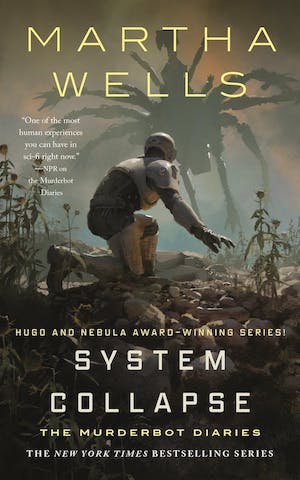It seems like we’ve all embraced the concept of comfort reads (and comfort shows/movies) lately, particularly over the last few tumultuous years. There are cozy mysteries, domestic fantasies, stories where nothing bad happens, books that focus above all on kindness and caring—the kind of tales we turn to and share whenever we need to feel better about the world. Well, I’d like to acknowledge another type of story that belongs in this category: Competence porn. I find that competence porn can be really, really comforting (and I’d welcome more of it, so if you have any recommendations, please mention them in the comments!).
If you know what I’m talking about, you probably don’t require much convincing. If you don’t, I’ll break it down for you: What the hell is competence porn?
The term was coined by John Rogers, creator of the TV show Leverage—one of our best examples of this particular type of storytelling. If you’re not familiar with Leverage, the show is about four professional thieves with distinctive skill sets who team up with a mastermind planner to get revenge on rich and powerful assholes who take advantage of people and ruin their lives for profit. (It’s extremely gratifying.)
Rogers wanted a shorthand way to talk about the very specific kind of satisfaction that we feel when watching folks competently handle complex situations using the kinds of specialized skills and expertise that we can all appreciate (even if we can’t personally replicate them), and he came up with “competence porn.” It’s about both the process and the outcome, and the comforting safety net of knowing that whatever challenge arises, the whole thing is in, well, extremely competent hands. Of course there are different permutations and varieties and genres involved, but we can lay out some basic ground rules—a formula for the type of story we’re talking about, for the sake of discussion.
First of all, we need experts: People who are so good at their craft that they can improvise and rise to any challenge, adapting to any obstacles or changes in the plan. We start with our mastermind, the genius who sees how all the pieces fit together, the big picture-seeing visionary with the top-down view, who keeps everyone calm even when the shit hits the fan. This mastermind is watching out for the team and also for us, the audience, providing the safety net we need. Knowing that this genius is around, thinking ten steps ahead, we feel safe enough to commit to enjoying the antics that will play out, as suspenseful as they may be, and we can allow ourselves to invest in and care about the characters, in spite of the massive risks they’re taking.
Next we need a team of specialists. Sure, you can absolute argue for something like the John Wick franchise being competence porn based around a single character (he certainly is competent!), but I tend to prefer stories built around the satisfaction that comes from seeing a team or group of extremely competent people synthesizing their skills and learning to work together. It’s thrilling in the same way as watching a big dance number with complex choreography, or really great improv comedy acts, with everyone hitting their mark at the exact right time—or if they didn’t, their team covered seamlessly, and the audience will never know. Thought that was a fatal blunder? Think again—either the misstep will be revealed to be intentional, or it will be used to the team’s advantage, so that everything turns out even better than expected. There’s just something incredibly satisfying about watching a group of people so perfectly attuned to one another that they can accomplish something none of them could alone.
Now, these team members need to be people who can solve problems within their area of expertise by thinking outside the box and coming up with just the right trick, hack, or workaround. They’ve seen every iteration of how things could go, and they have all that experience to call upon, as well as the ability to improvise and quickly shift to new variations rather than sticking rigidly to one original idea or plan.
Oh and speaking of the original idea? Well, actually, there tend to be dozens of “original” ideas: Plans A through Z have been careful considered and will often come up in comical discussion between characters. In the very first episode of Leverage, computer expert Hardison asks if it’s time to go to plan B, and mastermind Nate tells him, “Technically, that would be plan G.” When Hardison asks how many plans there are, “Is there like, a plan M?” Nate assures him that yes, he has thought that far ahead, but unfortunately, “Hardison dies in plan M.” This kind of banter is de rigueur between team members, particularly when they’re under pressure—this light repartee graces the conversation of recent competent teams like the Crows in Shadow and Bone, or Lockwood and his associates in Lockwood & Co.
When it comes one-upsmanship with one another over who’s the MVP of a particular caper or which variation of the plan is best, it’s generally best to have a good dose of smartassery all around. There may be some examples of competence porn that don’t draw on this type of humor, but for me, there’s nothing drearier than a story that takes the action so seriously that nobody can ever crack a joke—no matter how high the stakes are, there should always be room for a little fun or a quick quip.
So, who do we need on our team? Well, it depends on what you’re trying to accomplish. Leverage begins with a mastermind who brings together a hacker/tech expert, a hitter (the muscle), a master thief proficient in everything from cat burglary to safe-cracking to picking pockets, and a brilliant con artist (aka: the grifter). As is often the case in these stories, the team members start out as loners who don’t play well with others, but as they learn to cooperate professionally, they eventually find themselves growing into friends, and even family. The plots are often, but not always, capers (think The Italian Job, or Ocean’s Eleven). Depending on your goals, your ideal team might include a driver, a demolitions expert, a magician, a forger, or a really good librarian. Whatever the situation calls for, they’ll be the best in their field, and probably have a bone to pick with powerful (often corrupt) individuals and institutions.
Buy the Book


System Collapse
Because “competence porn” isn’t quite a genre and examples that tick most of the boxes above aren’t marketed as such, it’s always a delight to recognize one of these types of stories—and perhaps it would be best to call it a team dynamic instead of a genre (depends on how strict you are about labels). I’ve seen examples spring up all over the place in newer science fiction and fantasy stories, and I couldn’t be happier. Hyper-competent Murderbot learns to work with others (multiple times) and everything comes together when they learn to trust each other in Martha Wells’ Murderbot series. Galadriel “El” Higgins, from Naomi Novik’s Scholomance trilogy, works her team of wizards hard because it’s the only way to stay alive—but together, they thrive. Even the day-to-day grind of working in local government that we see on Parks and Recreation is incredibly fun to watch because Leslie Knope and her team (regardless of their attitudes toward their jobs—looking at you, Ron Swanson…) are actually all fantastic at what they do.
There’s something so very gratifying about watching people live up to their full potential—getting to see all the hard work they put in pay off, not just in their private satisfaction but as part of a group of similarly talented, driven people who have dedicated themselves to their craft, and a shared goal. It’s not unusual to dream about being outstandingly good at something, and in the end there’s a level of pure enjoyment that comes from seeing someone doing something they love, perform flawlessly, and win the day.
As I mentioned up at the top, I’m always searching for new books, shows, movies (or anything else) that fits into the category of “competence porn,” so I’d love to hear your thoughts, suggestions, and favorite examples of hyper-capable teams of rogues, professionals, and/or unlikely heroes—please share in the comments.
Rachel Ayers lives in Alaska, where she writes cabaret shows, daydreams, and looks at mountains a lot. She has a degree in Library and Information Science which comes in handy at odd hours, and she shares speculative poetry and flash fiction (and cat pictures) at patreon.com/richlayers.










